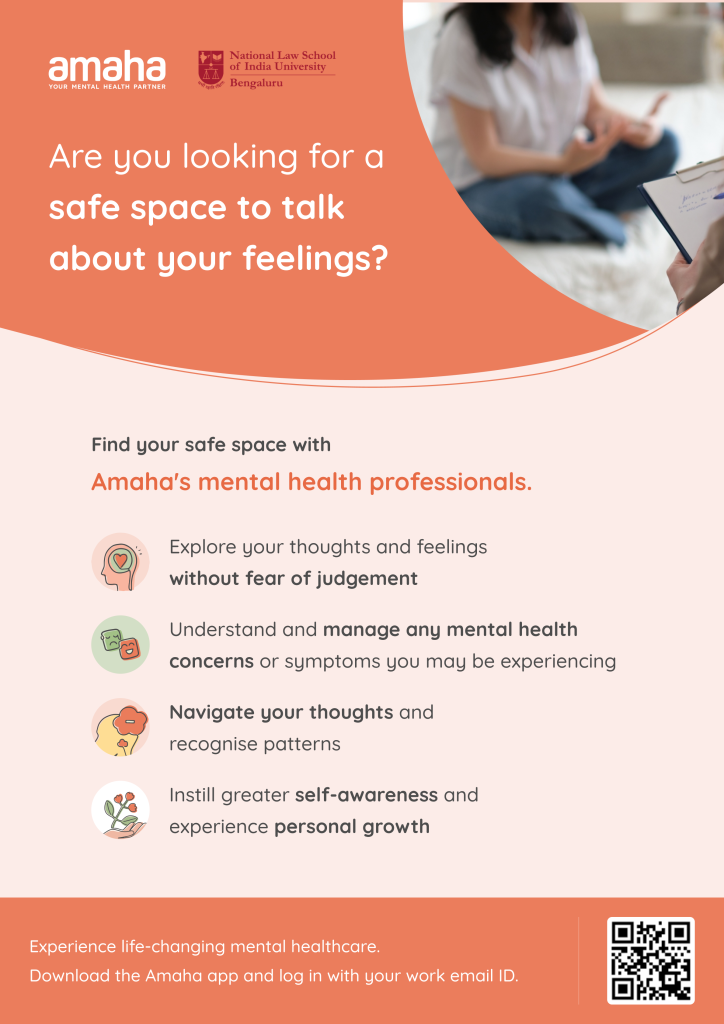NLSIU Launches ‘Workplace Emotional Well-being Programme’
January 18, 2024
 Recognising the need to make mental health a priority at the workplace, NLSIU has launched mental health services for its faculty and staff in January 2024. The University has partnered with MindCrescent Wellness Ventures Pvt. Ltd (Amaha), to create a ‘Workplace Emotional Wellbeing Programme’ as part of this initiative. Amaha is a mental health platform built by therapists and psychiatrists with global experience and a commitment to providing quality care.
Recognising the need to make mental health a priority at the workplace, NLSIU has launched mental health services for its faculty and staff in January 2024. The University has partnered with MindCrescent Wellness Ventures Pvt. Ltd (Amaha), to create a ‘Workplace Emotional Wellbeing Programme’ as part of this initiative. Amaha is a mental health platform built by therapists and psychiatrists with global experience and a commitment to providing quality care.
Over the last few years, mental health has emerged as one of the key issues that affects the society at large. In 2020, the University set up a Student Welfare Office, and ensured mental health and emotional well-being services to its student community. Today, we are happy to extend these services to the entire community.
The launch of these services was initiated through a 45-minute webinar with Amaha which was attended by NLSIU faculty and staff. Speaking about the common stressors that could lead to mental health concerns, the Amaha team said: “In today’s environment, stress extends beyond deadlines. The challenges posed by economic uncertainties, digital advances, and overwhelming information online; along with responsibilities, and societal pressures; can be daunting. Amid all these concerns, open communication and seeking support from family, friends, or a professional often go a long way. One must also practise self-care, set healthy boundaries, and access organisational support whenever required.”
We spoke to our People and Culture Officer, Anjali Varma to share more about this initiative.
On introducing these services at NLSIU: a first of its kind initiative at the University
There are three primary reasons on why we decided to introduce this to the NLSIU employee community:
- First, providing mental health services at the workplace is a best practice.
- Second, for decades mental health had been pushed under the carpet, spoken of in hushed tones, and stigmatized. Post Covid-19, there has been a growing acceptance that the subject needs attention and collective intervention.
- Third, there is enough data to show that mental health is one of the key issues that affects working professionals (Studies have shown that approximately one in four adults struggle with some form of a mental health issue).
We want to ensure that our faculty and staff feel supported at work. While every person or age group has their own unique set of challenges, many of our employees are in the 21-35 years bracket. Many are staying in nuclear set-ups, are either first-time professionals or managers, first-time parents, or are new to the city. Each role or situation places different demands on us as professionals and by providing these services and adding them to the current benefits, we are trying to create an ecosystem that makes employees feel supported at work.
On how employees at NLS can make use of the Amaha services:
The NLSIU “Workplace Emotional Wellbeing Programme” will include therapy sessions (including three free sessions), newsletters, webinars, self-assessments, programmes, mood trackers and access to a self-care library. Sessions are online and can therefore be accessed from the privacy of the home. The therapy sessions and surveys are completely confidential and are in multiple languages, as we have a diverse workforce. Details on how to use the App can be easily accessed through our microsite and ERP platform.
On why these services are essential for any institution/organisation:
The first conversations that acknowledged wide-spread anxiety and depression began to emerge in the months after the world went into lockdown, and organisations had to shift to a work-from-home arrangement. Economic uncertainties and health concerns were compounded by technology and the “always on” culture, and these took the topic of mental health from closed cubicles to social media handles and brought it right into our homes. This much-needed awareness made the average person understand the range, prevalence and complexity of the term ‘mental health’ that has been used unilaterally and often looked upon as one amorphous and fuzzy subject. Today, with increased conversation and debate, mental health is understood as anything that affects our emotional, psychological, physical, and social well-being- and incorporates a spectrum of issues, from feelings of emptiness and anxiety to long-term stress and disorders.
Mental Health has reached an inflection point and organisations have realised this and stepped in to help employees cope with and recover from mental health issues. By putting in place enabling frameworks, organisations are reassuring employees that the employer always has their back.
For more information regarding these mental health services at NLSIU, please write to

